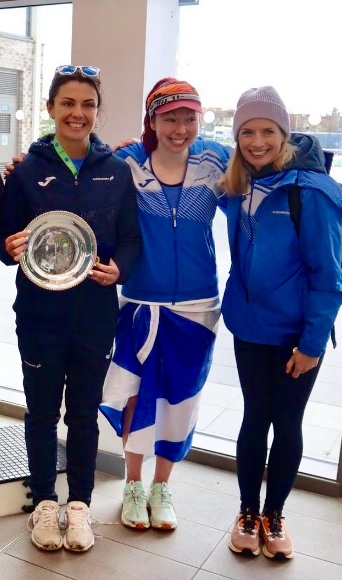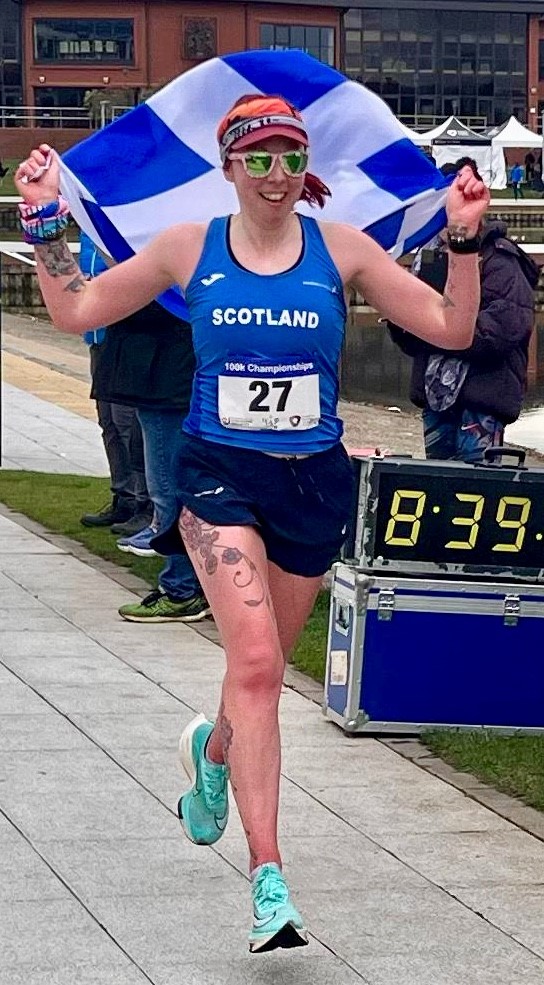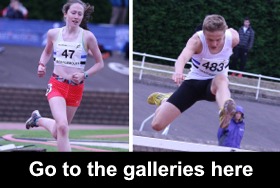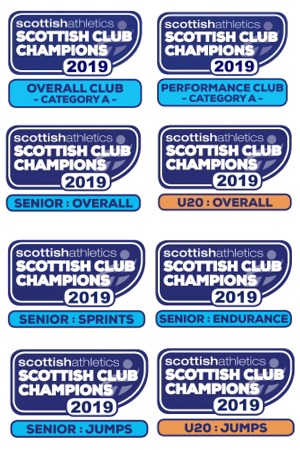Amanda Woodrow

“My legs were destroyed, but I kept running and didn’t give up…” Edinburgh Athletic Club’s Amanda Woodrow has won battles with anorexia and sepsis in the past, so when the going got tough at the recent Anglo-Celtic Plate 100km road race, nothing was going to stop her…
The Anglo-Celtic Plate, seen by many as the pinnacle of UK and Irish ultra-endurance running, features international-level teams from Scotland, England, Ireland, Wales and Northern Ireland. The annual event rotates around different venues in the UK and Ireland, and was held this year in Craigavon, Northern Ireland, at the start of April.
Woodrow, a 34-year old psychology researcher and qualified athletics coach, originally from Fife, long-time resident of Edinburgh, and now based in the Borders, was making her debut at the 100km distance, and representing Scotland for the first time. She completed the race in a time of 8 hours and 39 minutes, finishing 5th overall and 2nd Scottish female. Along with her Scottish team-mates Emma Murray (8:26) from Jog Scotland Kintore, and Portobello RC’s Catherine Cowie (8:52), Scotland’s ladies were triumphant, returning home with the famous Anglo-Celtic Plate trophy.
Selection for the Scotland team followed Woodrow winning the 2022 Scottish 50km road race championships, clocking an impressive time of 3 hours and 47 minutes. Recently she has also competed successfully in several other ultra-marathons, ran the West Highland Way three times, and completed an epic Land’s End to John O’Groats running challenge.
However, the 100km Anglo-Celtic Plate race didn’t go exactly to plan for Woodrow, in what were unusually warm conditions in Northern Ireland. She said: “It was an early start and the first half of the race was fine, I went through halfway in under 4 hours. But in the second 50km, when it warmed up, I got a bit of heatstroke and sunburn. I started being sick and couldn’t keep any nutrition down. With 15km to go I was destroyed, but I kept running and didn’t give up. It wasn’t the performance I had trained for and hoped for, but I’m delighted to have finished. It was an incredible experience, and to win the Anglo-Celtic Plate with my Scotland team-mates was amazing!”
No stranger to adversity, Woodrow has battled back from a number of difficult and life-threatening situations, making it all the more remarkable that she is now ultra-running at international level. She started out as a promising 800m and 1500m track runner as a junior and young adult, and competed all over the UK and Europe. But in the early years of her athletics career, Woodrow suffered from anorexia which subsequently brought on a number of serious injuries, and she was eventually hospitalised.
She reflects: “I realise now that back then I was overtraining and under-fuelling myself. It wasn’t sustainable, my body and mind were gradually deteriorating, and eventually I reached breaking point. Building back to health was a tough journey. I know now that it’s vital for athletes of all ages, but particularly for young and developing athletes, to fuel their bodies well. It’s good to see that nowadays there is much more awareness about eating disorders and RED-S (Relative Energy Deficiency in Sport). Sports clubs and coaches seem to be a lot more mindful of the issue. It’s so important.”
Woodrow battled back from anorexia and RED-S, and got her life and athletics career back on track, taking to road racing as well as track running. She also became an ambassador and volunteer for Beat (an eating disorders charity), began a PhD, and continued with her athletics coaching role.
But this hard-won stability was shattered by a freak case of sepsis, brought on by a routine injection, which left her fighting for her life in Edinburgh Royal Infirmary. She explained: “Sepsis happens when your body’s immune system over-reacts to an infection, causing serious damage to your organs and tissues. Generally, people don’t realise how serious sepsis is. You deteriorate very quickly and it’s life-threatening. It completely destroyed one of my glute muscles, there’s not much left of it now, but I consider myself lucky. I had a lot of rehabilitation work to do, but I was so determined to get back to running, it’s what I love to do and it really gave my recovery a focus.”
Woodrow persevered with her recovery and rehabilitation, and completed her PhD, but she could never have imagined that within a few years she would be representing Scotland at the 100km distance. She said: “I was left with a massive imbalance because the sepsis basically ravaged my entire left glute, and I soon realised my body wouldn’t be able to handle the intensity of track running and shorter road races. So I started back running slowly, I gradually built up my strength, and I found I was enjoying building up to longer distances. But running for Scotland in the Anglo-Celtic Plate 100km race is beyond anything I thought I could achieve in athletics!”

Edinburgh Athletic Club coach Alex MacEwen spoke highly of Woodrow’s achievements and contributions to athletics, saying: “Amanda has been with our club for nearly 20 years and has competed at every distance, on the track, road, trails and hills, from local ParkRuns to European track championships to international 100km events. She doesn’t just win medals but also wins total respect from everyone. She has built up a great knowledge of the sport which she passes on to others through her coaching and contributions to discussions on diet and body image. And she’ll always give you a smile and a wave as she runs gracefully past!”
Woodrow has proven her resilience many times, but could be forgiven for putting her feet up for a while in the aftermath of her Anglo-Celtic Plate exploits. However, she is already looking to the future, intending to run the 42-mile “Devil o’ the Highlands” race in August, and then the Valencia Marathon in December. She also has unfinished business with the 100km distance, saying: “I know I can do better in the 100km. I learned a lot from my first attempt, and I know I am capable of a much faster time. So I would really love to go back and give the distance another go, and do myself justice. I also hope that my first Scotland vest won’t be my last…!”
John Lenehan
For further information on the issues raised in
this article, see: www.red-s.com
www.beateatingdisorders.org.uk
www.sepsisresearch.org.uk








